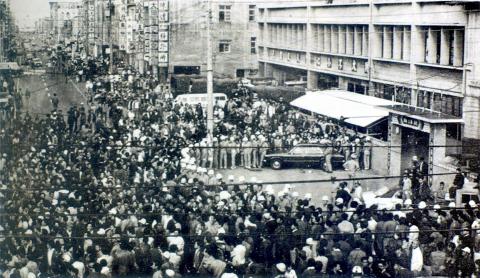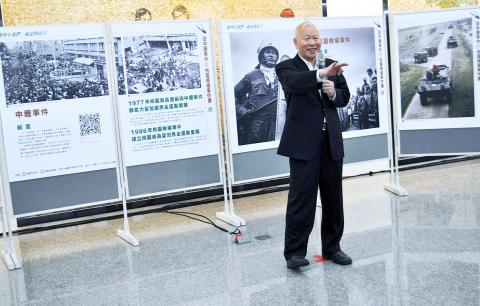Taiwan in Time: Nov. 14 to Nov. 20
On the morning of Nov. 19, 1977, an elderly couple arrived at Jhongli Elementary School (中壢國小) to cast their votes for Taoyuan county commissioner.
The election supervisor, Fanchiang Hsin-lin (范姜新林) reportedly stepped in and voided their votes for Hsu Hsin-liang (許信良), a Taoyuan native and former Chinese Nationalist Party (KMT) politician who had published two books criticizing his party earlier that year, and ran for the position despite the KMT already nominating a candidate. He had been expelled from the party in the previous month.

Photo: Chang Fu-chong
There had long been speculation that the KMT was interfering with past elections to prevent dangwai (黨外, outside the party) politicians from winning. Just two years previously, they allegedly foiled outspoken KMT critic Kuo Yu-hsin’s (郭雨新) bid for a legislative seat by simply discarding ballots for him in the voided pile. After this was discovered by citizens at an Yilan polling station, about 20,000 people took to the streets and surrounded the county government office.
Fanchiang explained to the media that the couple went to the same voting booth and kept talking to each other, which is against the rules. He added that they used their personal seals instead of the stamp the polling station provided. Whether that was the case, to many disgruntled citizens, it simply added fuel to the fire.
After hearing that their vote was voided, the two returned to the polling station to ask for a new ballot, but Fanchiang refused. An argument broke out, and the couple were taken to Jhongli police station.

Photo: Li Jung-ping, Taipei Times
Word spread quickly, and soon hundreds of people gathered outside of the school and clashed with the police. After toppling a number of police cars, some stormed the police station and started destroying items inside. The police retaliated with tear gas, but this did not stop the mob from setting cars on fire. Finally, they ended up burning down the entire station.
The police allegedly fired at the crowd at one point, resulting in two civilian deaths.
“Because of what happened in Jhongli, election staff became extra careful and properly announced and displayed each ballot during the counting process,” Hu Huei-ling (胡慧玲) writes in the book, One Hundred Years of Pursuit (百年追求). Hsu won by a large margin.
POLITICAL WATERSHED
Later known as the Jhongli Incident (中壢事件), it was the first large-scale civil disturbance since the 228 Incident 30 years previously. Political science professor Lien Pei-te (連培德) writes that it was a “watershed in the liberalization movement” as it “exposed the KMT to internal and international demands for political liberalization and the inevitability of political change.”
“It also provided a blueprint of action to subsequent and larger-scale movement activities such as the [Kaohsiung Incident],” Lien adds.
Thomas Gold writes in his book State and Society in the Taiwan Miracle that the incident was “extraordinary,” in a “newly industrializing society noted for its strict authoritarianism and politically apathetic populace, a segment of the people had resorted to such an extreme and risky act to vent its frustration.”
Gold added that Taiwan had seen a relatively long period without any social or political upheaval.
Chan Chia-wen (詹嘉雯) explores the incident as a defining moment in Taiwanese history in the study The Jhongli Incident and the Transformation of Taiwan’s Politics (中壢事件與台灣政治轉型).
First of all, the dangwai became increasingly organized as they gained more clout through the election, even though parties outside of the KMT were still banned.
“Before 1977, the opposition often fought their battles individually, trying to exert pressure on the KMT by participating in local elections,” Chan writes.
But soon after the incident, the Taiwan dangwai Personages Election Assistance Group (台灣黨外人士助選團) was formed, putting together an international press conference in late 1978.
“The incident reflected the power of the people, and many intellectuals felt less fear about participating in politics or the dangwai. As a result, many of them became new recruits for the dangwai,” Chan writes.
A year later, other dangwai politicians such as Annette Lu (呂秀蓮), who would later become vice president, followed Hsu’s example and started openly publishing books critical of the KMT for their campaigns.
The fact that the incident did not turn into another 228 was also encouraging. Even though two people died in the immediate clashes, Hu writes that then-premier Chiang Ching-kuo (蔣經國) forbade the army from interfering and refrained from violent suppression or retaliation. Instead, Chiang beefed up his riot police force to prepare for further incidents.
Of course, it would not be all smooth for the dangwai, as is evident in suspension of central elections in late 1978 and the Kaohsiung Incident of 1979, where a pro-democracy rally turned violent and led to the mass arrests of dangwai members. But to many, the Jhongli Incident was a new beginning.
Taiwan in Time, a column about Taiwan’s history that is published every Sunday, spotlights important or interesting events around the nation that have anniversaries this week.

Oct. 21 to Oct. 27 Sanbanqiao Cemetery (三板橋) was once reserved for prominent Japanese residents of Taipei, including former governor-general Motojiro Akashi, who died in Japan in 1919 but requested to be buried in Taiwan. Akashi may have reconsidered his decision if he had known that by the 1980s, his grave had been overrun by the city’s largest illegal settlement, which contained more than 1,000 households and a bustling market with around 170 stalls. Fans of Taiwan New Cinema would recognize the slum, as it was featured in several of director Wan Jen’s (萬仁) films about Taipei’s disadvantaged, including The Sandwich

“Wish You Luck is not just a culinary experience, it’s a continuation of our cultural tradition,” says James Vuong (王豪豐), owner of the Daan District (大安) Hong Kong diner. On every corner of Kowloon, diners pack shoulder-to-shoulder over strong brews of Hong-Kong-style milk tea, chowing down on French Toast and Cantonese noodles. Hong Kong’s ubiquitous diner-style teahouses, known as chachaanteng (茶餐廳), have been a cultural staple of the city since the 1950s. “They play an essential role in the daily lives of Hongkongers,” says Vuong. Wish You Luck (祝您行運) offers that same vibrant melting pot of culture and cuisine. In

Much noise has been made lately on X (Twitter), where posters both famed and not have contended that Taiwan is stupid for eliminating nuclear power, which, the comments imply, is necessary to provide the nation with power in the event of a blockade. This widely circulated claim, typically made by nuclear power proponents, is rank nonsense. In 2021, Ian Easton, an expert on Taiwan’s defenses and the plans of the People’s Liberation Army (PLA) to break them, discussed the targeting of nuclear power plants in wartime (“Ian Easton On Taiwan: Are Taiwan’s nuclear plants safe from Beijing?”, April 12, 2021). The

Artificial intelligence could help reduce some of the most contentious culture war divisions through a mediation process, researchers say. Experts say a system that can create group statements that reflect majority and minority views is able to help people find common ground. Chris Summerfield, a co-author of the research from the University of Oxford, who worked at Google DeepMind at the time the study was conducted, said the AI tool could have multiple purposes. “What I would like to see it used for is to give political leaders ... a better sense of what people ... really think,” he said, noting surveys gave